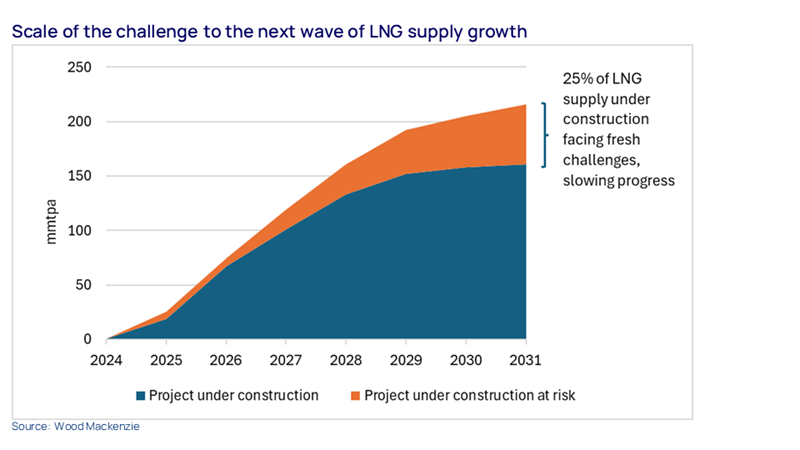Sign up today to get the best of our expert insight in your inbox.
Keeping the LNG bandwagon rolling
Three key challenges to future growth
3 minute read
Simon Flowers
Chairman, Chief Analyst and author of The Edge

Simon Flowers
Chairman, Chief Analyst and author of The Edge
Simon is our Chief Analyst; he provides thought leadership on the trends and innovations shaping the energy industry.
Latest articles by Simon
-
The Edge
A world first: shipping carbon exports for storage
-
The Edge
WoodMac’s Gas, LNG and the Future of Energy conference: five key themes
-
The Edge
Nigeria’s bold strategy to double oil production
-
The Edge
US tariffs – unpredictability is the strategic planners’ nightmare
-
The Edge
US upstream gas sector poised to gain from higher Henry Hub prices
-
The Edge
What comes after the Permian for IOCs?
Gavin Thompson
Vice Chairman, Energy – Europe, Middle East & Africa

Gavin Thompson
Vice Chairman, Energy – Europe, Middle East & Africa
Gavin oversees our Europe, Middle East and Africa research.
View Gavin Thompson's full profileMassimo Di Odoardo
Vice President, Gas and LNG Research

Massimo Di Odoardo
Vice President, Gas and LNG Research
Massimo brings extensive knowledge of the entire gas industry value chain to his role leading gas and LNG consulting.
View Massimo Di Odoardo's full profileThe LNG industry is on a roll. The ‘club’ continues to grow as new buyers swell the ranks. LNG commoditisation is increasing market liquidity, supported by a growing number of traders, hedge funds and NOCs. What’s more, capital remains available for new supply projects and import infrastructure.
But the pace of future growth can’t be taken for granted. Ahead of next week’s Gastech conference in Houston, we identify three structural challenges that must be addressed to keep the LNG bandwagon rolling. Gavin Thompson, Vice Chair, EMEA, and Massimo Di Odoardo, Vice President, Gas & LNG Research, pick up the story.
First, the timing and scale of the next wave of LNG supply the market will need to meet demand in the early 2030s is in some jeopardy, with up to 60 Mtpa of facing fresh challenges.
In the US, Next Decade’s chunky Rio Grande project faces legal challenges over its existing authorisation from the Federal Energy Regulatory Commission. While construction of Phase 1 continues, the court's decision could impact the timing of project start-up and a final investment decision (FID) on Train 4. More broadly, such legal challenges may also impede US pre-FID projects, compounding the uncertainty created by the Biden administration’s “pause” on export approvals in January. We expect the pause will be lifted after the November presidential election, but how quickly a new framework for approval will be developed and how it will evolve is unclear.
Elsewhere, the start-up of Russia’s Arctic LNG-2 is proving even more difficult than expected as US and European sanctions bite. Future Russian LNG development will struggle. Meanwhile, project development in Mozambique remains mired in political and security challenges. Supply growth from Qatar and Abu Dhabi will help paste over the cracks, but the timing of the next wave of supply looks less certain than 12 months ago.
Second, future Asian demand growth at the scale anticipated cannot be taken for certain. Right now, everything looks rosy, with emerging Asia imports up 15% in the first eight months of 2024. But concerns over supply availability could quickly dent buyers’ appetite. Many key growth markets across Asia remain hugely price sensitive. If supply growth is less pronounced than previously anticipated, then buyer confidence could prove fragile in the much-awaited rebalancing of the global LNG market – when softer prices should help crystalise Asian demand – from around 2026.
A tighter global LNG market would inevitably keep spot and contract prices higher, making a shift away from coal less attractive for Asian markets. It would also erode the investment required to unlock Asian LNG demand and infrastructure growth potential.
Third, the LNG industry is facing growing scrutiny over its emissions credentials. Europe is at the forefront, with the methane emissions of all hydrocarbon imports now subject to reporting requirements and potential penalties. An EU tax on all LNG methane emissions cannot be ruled out. Further down the line, we may even see the EU implement a broader tax on all GHG emissions from LNG imports.
Where the EU is leading, others may follow. The industry should see rising carbon taxes as an opportunity to reduce its carbon footprint, removing any hesitancy around using investment to cut emissions. All companies need to be ready to act. Only by addressing its carbon emissions can the industry build LNG’s credentials as an essential transition fuel.
As the official Knowledge Partner of Gastech 2024, Wood Mackenzie brings its industry expertise and distinct viewpoint to the dialogue about the future of gas and LNG. Wood Mackenzie will host a series of invite-only leadership roundtables, present at the strategic conference and moderate many senior panel sessions.
Don't miss the opportunity to visit us at our booth B213, Hall 3 and meet our leading industry experts, demo our products and hear our latest gas and LNG insights.
Make sure you get The Edge
Every week in The Edge, Simon Flowers curates unique insight into the hottest topics in the energy and natural resources world.









